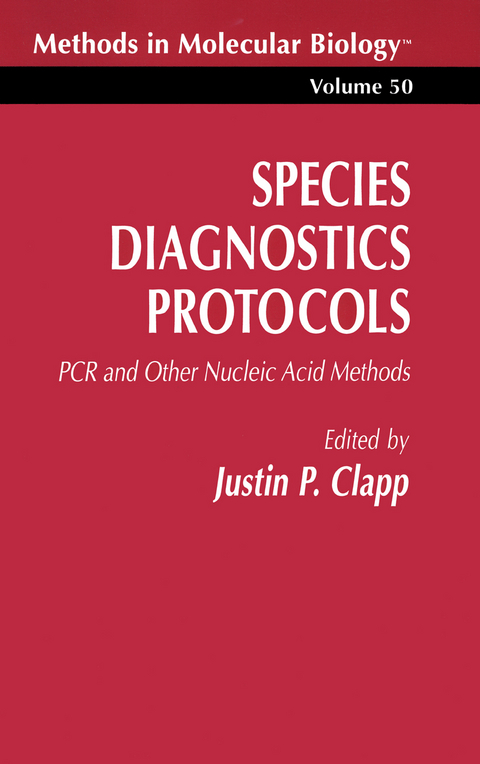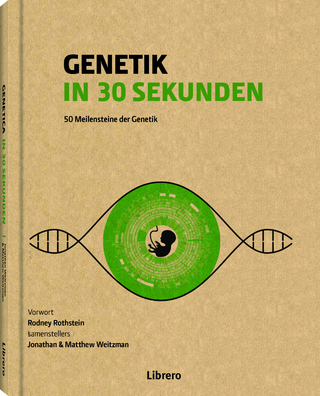
Species Diagnostics Protocols
Humana Press Inc. (Verlag)
978-0-89603-323-8 (ISBN)
Species Diagnostics Protocols: PCR and Other Nucleic Acid Methods is premised on the rapid development in recent years of the use of nucleic acid-based technology for the identification of various organisms. The majority of applications have been in such medically related fields as the diagnosis of disease or the identification of dis ease vectors, but this emphasis is changing as the potential and range of the techniques becomes more generally recognized. This has been especially true since the advent of polymerase chain reaction (PCR) technology. The use of nucleic acids for diagnostic purposes offers numerous advantages over conventional methods of identification. It must be stressed, however, that conventional methods are still extremely valuable and will always remain at the forefront of many diagnostic procedures. The ability of the skilled taxonomist begins to fail when there is a requirement to identify rapidly organisms that are small, immature, or present in large numbers. In such cases the time scale necessary to obtain an identification often precludes practical usage. It is in this context that molecular methods come into their own. There are several advantages that DNA can offer diagnostics other than the obvious and important fact that its base sequence is the fundamental source of biological variation. It offers a great amount of information that is not accessible to other methods of identifica tion because the vast majority of DNA is not expressed.
Isolation and Purification of Plant Nucleic Acids.- Isolation and Purification of Insect DNA.- Isolation and Purification of Vertebrate DNAs.- Statistical Analysis of Arbitrarily Primed PCR Patterns in Molecular Taxonomic Studies.- Molecular Identification of Phytopathogenic Viruses.- Improved PCR Methods for Identification of Phytopathogenic Viruses.- PCR Detection of HIV.- The Use of Consensus PCR and Direct Sequence Analysis for the Identification of HPV.- The Identification of Dengue Virus Using PCR.- The Design and Application of Ribosomal RNA-Targeted, Fluorescent Oligonucleotide Probes for the Identification of Endosymbionts in Protozoa.- Subtraction Hybridization for the Isolation of Strain-Specific Rhizobium DNA Probes.- The Use of RAPD for Generating Specific DNA Probes for Microorganisms.- ITS-RFLP Matching for Identification of Fungi.- Specific PCR Primers for the Identification of Endomycorrhizal Fungi.- Single-Strand Conformational Polymorphism (SSCP) for the Identification of Endomycorrhizal Fungi.- The Use of RAPD for Isolate Identification of Arbuscular Mycorrhizal Fungi.- Establishing Relationships Between Closely Related Species Using Total Genomic DNA as a Probe.- Detection and Characterization of Leishmania Parasites by DNA-Based Methods.- The Molecular Identification of Trypanosomes.- Detection and Identification of the Four Malaria Parasite Species Infecting Humans by PCR Amplification.- The Use of Degenerate Primers in Conjunction with Strain and Species Oligonucleotides to Classify Onchocerca volvulus.- The Use of Synthetic DNA Probes for the Field Identification of Members of the Anopheles gambiae Complex.- PCR of the Ribosomal DNA Intergenic Spacer Regions as a Method for Identifying Mosquitoes in the Anopheles gambiae Complex.- Restriction Fragment Length Polymorphism (RFLP) Analyses.- Differential Screening for the Isolation of Species-Specific Sequences in the Anopheles farauti Complex.- RAPD-PCR with Parasitic Hymenoptera.- The Use of Selective Enrichment for the Isolation of Species-Specific DNA Probes for Insects.
| Erscheint lt. Verlag | 26.10.1995 |
|---|---|
| Reihe/Serie | Methods in Molecular Biology ; 50 |
| Zusatzinfo | XI, 416 p. |
| Verlagsort | Totowa, NJ |
| Sprache | englisch |
| Maße | 152 x 229 mm |
| Themenwelt | Naturwissenschaften ► Biologie ► Genetik / Molekularbiologie |
| Naturwissenschaften ► Biologie ► Mikrobiologie / Immunologie | |
| Naturwissenschaften ► Biologie ► Zellbiologie | |
| ISBN-10 | 0-89603-323-6 / 0896033236 |
| ISBN-13 | 978-0-89603-323-8 / 9780896033238 |
| Zustand | Neuware |
| Haben Sie eine Frage zum Produkt? |
aus dem Bereich


